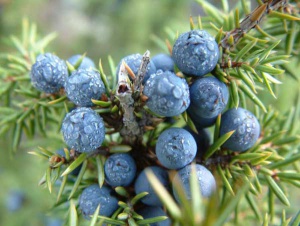Juniper
Contents
Origin & Description
Juniper is an evergreen shrub that is found growing in Europe, North America, North Africa and Northern Asia. In the wild, it has been known to grow up to 30 feet in height, but under cultivation is normally 6 feet high. Junipers have dull green needles which are very sharp, and arranged in groups of three. They produce small yellow flowers and the female plants possess blue/black berries or fruit when mature that embrace a bittersweet aroma.A few of the common names used are dwarf juniper, ground juniper and juniper berry. The parts frequently prepared for medicinal purposes are the berries, needles, twigs and wood.
Actions
The Juniper herb is an anti-fungal, anti-rheumatic, urinary antiseptic, astringent, anti-spasmotic, carminative (relieves intestinal gas pain and distension), diuretic (increases secretion and flow of urine), parasiticide (kills parasites or worms), stimulant (increases internal heat, strenghtens metabolism and circulation), stomachic (strenghtens stomach function) and digestive tonic.
Medicinal Uses
The diuretic properties of this herb lie in the volatile oil extracted from its berries. It is used for increasing the flow of urine and purification of the blood, which tones the body system and reduces susceptibility to disease. The oil is also known for its value in aromatherapy.
Juniper is naturally high in producing insulin where there is a deficiency, therefore beneficial is the treatment of diabetes. It's commonly known as a kidney herb, and is helpful for those suffering with kidney stones. Lye from the ashes of the Juniper have been used for relief of itching and scales resulting from leprosy.
Being an excellent antiseptic, Juniper berries can aid in treating cystitis by removing acid and toxic wastes. The berries can also help with digestion problems and weak stomach symptoms. Following are some conditions that may improve with the use of the Juniper herb.
- Abrasions
- Acne
- Adrenal weakness
- Arthritis
- Bladder problems
- Bleeding
- Common Cold
- Cystic fibrosis
- Diabetes
- Dropsy
- Fungal infections
- Hypoglycemia
- Nephritis
- Kidney infections
- Kidney Stones
- Urinary tract infections
Culinary & Other Uses
Crushed Juniper berries are very popular for use in marinades for game, beef and pork. They're also used in stuffings, sausages, stews and soups. This herb blends well with thyme, sage, oregano, marjoram, bay leaves, allspice, onions and garlic.
The alcoholic beverage Gin, gets its unique flavor from Juniper berries. It is named from the adaptation of the Dutch word for Juniper, geneva. This herb is also enjoyed by many as a tea.
The foliage is used to freshen stale air, and the Swiss burned the berries along with heating fuel to sanitize the air.
Side-Effects
Juniper causes uterine contractions, is strongly vaso-dialating and has a diuretic effect, therefore should not be used by pregnant women.
Prolonged use will cause the urine to smell like violets, and that symptom should encourage the discontinuation of ingestion. Overdose will cause renal irritations and blood in the urine.

